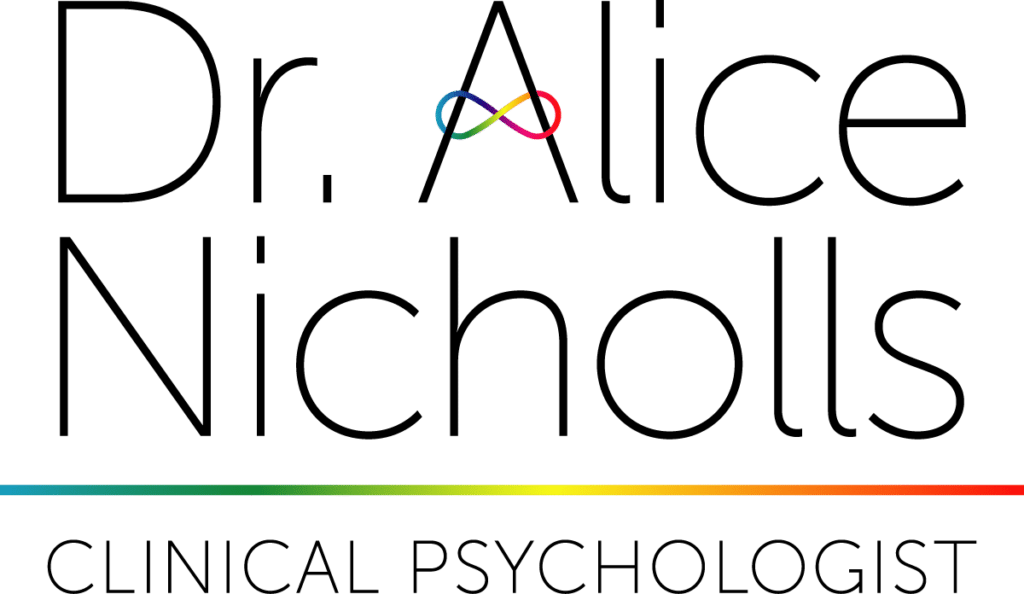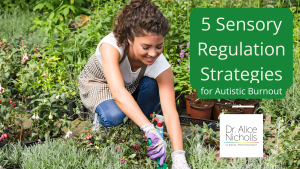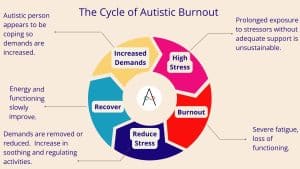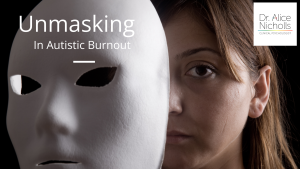If you are a late-realised, high-masking Autistic person you have probably struggled with shame at some point in your life.
For people in the Autistic Burnout Recovery Membership it comes up time and time again.
It can make us feel unwanted and alienated from the people around us.
It can make us feel as if we are not worthy of having our needs met.
It can make us feel alone and unable to connect with others.
It can be a massive block to recovery from Autistic Burnout.
In this article I will discuss:
- What shame is
- Why we have shame
- Why shame is a particular issue for Autistic people
- How shame contributes to Autistic Burnout
- What helps
What is Shame?
Shame is a social emotion, so it’s something that we feel due to our relationships with other people.
It happens when we perceive that there is something about us that other people wouldn’t like, or would cause them to exclude us.
This is often based on real life experience of being bullied, harassed, abused or excluded for being different.
It’s associated with thoughts such as I’m not good enough, people don’t like me.
It causes us to want to hide the aspects of ourselves that we think other people wouldn’t like.
It is different from guilt in that guilt motivates us to take reparative actions when we feel bad we have upset someone whereas shame makes us think we are flawed as a person and want to hide those aspects of ourselves.
Shame can be a massive motivator for masking in Autistic people. Particularly if you have been late-realised and have not understood why you are different from the majority of other people.
Why Do We Have Shame?
Our prehistoric, hunter gatherer ancestors survived by living in groups, because it enabled sharing skills and resources.
To be left out of the group, to be disowned, was a threat to our survival.
In theory this made shame and guilt adaptive emotions. We evolved to have them because they increased our chances of survival.
They are part of our threat system, just as much as fear of predators or heights are.
Feeling shame in this sense would have protected us and enabled us to remain part of the group. It was essential to our survival.
Crucially it was just one group of people we needed to maintain relationships with.
Why is Shame an Issue for Autistic People?
In modern times, our ability to share information, to communicate around the globe and to have contact with almost every other human on this planet has enabled us to progress as a species, to continue to develop knowledge and technology.
The fear of social exclusion is real and based on ancient biology but we are comparing ourselves and being compared with others more than ever before.
Whereas in small hunter gatherer communities we would have been comparing ourselves, (and trying to fit in) with a small group of people, we are now at risk of being excluded from a massive number of groups.
We don’t need to be liked or included by everyone we meet, but our old brain doesn’t know this.
We’ve still got a pre-historic brain that perceives social exclusion as a threat to our survival.
And this is why Shame is such a big issue for Autistic people.
Unfortunately there are lots of sources of shame for Autistic people.
Even if you grew up undiagnosed, you will have had multiple experiences of being different, not fitting in.
You may have been bullied, abused or excluded for being different.
During your childhood you were likely exposed to problematic ideas and images about Autistic people.
Portrayals of Autistic people in the media have done us a lot of damage, showing us as uncaring, aloof and robotic.
The old literature on Autism very much framed it as a problem to be cured.
You, yourself may have had negative views about Autistic people before (and after)your own diagnosis or realisation.
And there’s the anti-diagnosis movement which implies autism is a bad thing that we shouldn’t want or need to be associated with.
And of course there are difficult social encounters with neurotypical people, where there is a between-neurotype communication issue that has, in the past been framed as the fault of the Autism, rather than a communication- between-neurotype problem.
How Shame Contributes to Autistic Burnout
If we are ashamed of something, we will try and hide it. we do this by compensating.
We act in a way that would provide counter evidence.
For Autistic people, we are talking about masking, trying to fit in, look neurotypical, but also more than that, we are talking about overcompensating for potential and actual criticism.
For example:
Emma struggles to speak at team meetings and doesn’t go for after work drinks with her colleagues. She has noticed other people inviting her, and talking to her less. She is worried that other people think she is a bad team member. She has internalised this as a belief that she is, underneath it all, a bad team member. Emma overcompensates by taking cakes to team meetings and organising birthday cards for colleagues.
In the above example I would like to stress that the problem isn’t the behaviour of making cakes and organising birthday cards, it’s the motivation.
If Emma is acting out of fear of social exclusion and shame then she is overcompensating.
If Emma is making cakes because she cares about her colleagues and wants to show them affection then that’s very different and, (as long as she has the energy, time and resources), would be good for her wellbeing.
The problem here is that the moment Emma stops making the cakes she feels scared she will be rejected or that people will find out she’s, underneath it all, not a good team member.
Because this isn’t a threat that is going away, We (autistic people) end up in a loop, where we feel like we have to keep doing something to escape the feelings of shame.
This is exhausting. It means we are working hard to just survive.
Meanwhile, all this threat and drive is associated with an increase in cortisol which inhibits oxytocin release which is associated with our ability to relax and have meaningful connections with other people.
So not only are we exhausting ourselves with threat and overcompensation, but we are also not accessing the rest and the types of interactions that would help to replenish us.
What Can We Do About it?
- Identify aspects of yourself you are trying to hide from others. To do this you could try completing these sentences:
- Autistic people are…
- Other people think Autistic people are…
- I should be…
- I’m worried that underneath it all I am…
- Identify how, when and where you are attempting to hide or compensate for these characteristics. to do this you might look back over the last few days at times when you felt you had to put in extra effort, or times when you were particularly fatigued. You can also try asking yourself what you would do to avoid being seen as [your answers to question 1]?
- Check out if you want to continue to hide or compensate for each of these characteristics by asking yourself:
- Is it essential to your survival?
- Is it essential for living in line with your values?
- Is it essential to a goal you have prioritised?
- Are you applying neurotypical standards to yourself?
- Are you trying to fit in with a group of people who wouldn’t like you otherwise?
- Are you trying to be liked by everyone?
- What would happen if you didn’t do it?
- What would be the benefits of not doing it?
- If you decide you don’t want to keep compensating for this characteristic make a plan to slightly reduce this overcompensation and review how you felt afterwards.
- If you decide you need to keep engaging in this compensation strategy then think about how you can do it while being kind and less shaming of yourself. For example instead of ‘I need to do this to hide the fact I’m not as good as everyone else’ you might reframe this as ‘this group of people have an unspoken social contract which I need to engage with in order to maintain my job’
- Where possible focus your energy on maintaining or initiating contact with people in your life who don’t make you feel ashamed, people with whom it will be safe to be more authentically yourself. These are the relationships you need to focus on. The people who are also autistic, the people who appreciate you for who you are or the people who are just open minded enough to accept you, as you are. If you are really struggling to think of anyone who fits any of these criteria then you might find it helpful to join some Facebook groups for Autistic people, to listen to podcasts by autistic people or to join groups focusing on a hobby or interest that you have.
Thinking about shame can be really difficult. If you find it is bringing up too many painful emotions and memories you might like to seek support from a therapist. I recommend finding a neurodiversity affirmative therapist via:
https://neurodivergenttherapists.com
or
https://www.thrivingautistic.org
Shame and overcompensation is/was the topic of the month for July 2024 in the Autistic Burnout Recovery Membership. You would be very welcome to join us. The workshop is also available as a stand-alone course with options for professionals to purchase and use with their clients.











